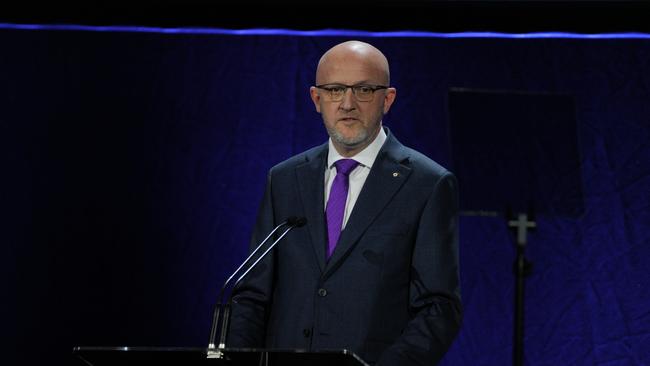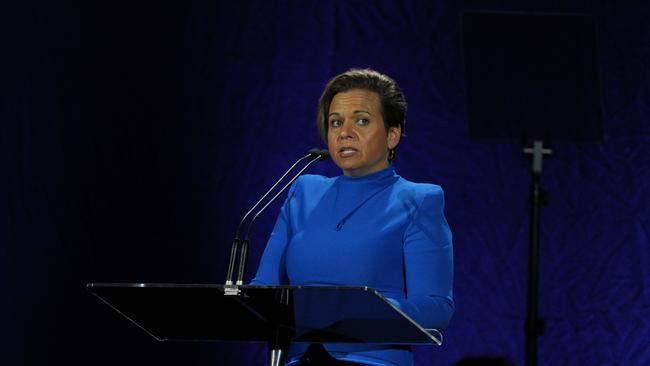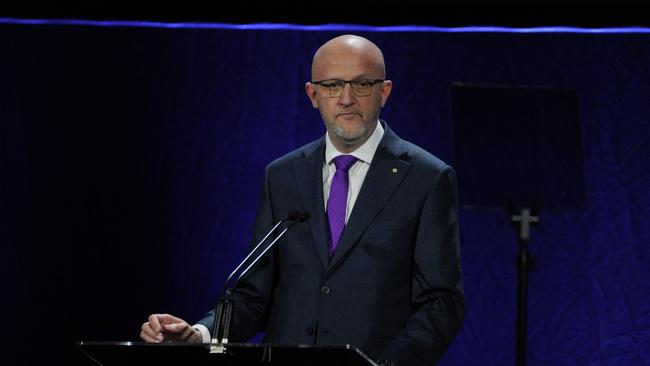Social media ‘world’s most potent accelerator’ of extremism: ASIO
ASIO director-general Mike Burgess has outlined how radicalising people has changed since the height of ISIS and Al Qaeda with the internet.

ASIO director-general Mike Burgess has called social media the “the world’s most potent accelerator” of extremism, as he outlined how radicalising people has changed since the height of ISIS and Al Qaeda with the internet.
It comes as the communications minister announced that parents would not be penalised if their children breached the government’s looming social media age limit, with the onus firmly on social media companies.
Speaking on day two of the joint NSW and South Australia social media summit in Adelaide, Mr Burgess warned it only takes “two clicks” to go from “the radical to the violent and extreme”.
He said users of any popular social media platform could visit a page run by someone with a radically hard-line religious interpretation espousing strong views but that does not advocate violence, hate speech or terrorism. The algorithm will then recommended similar pages, one of which encourages users to join an encrypted English-language Telegram channel. That Telegram channel is “explicitly pro-ISIL”, with messages of support for Australian terrorists, and statements justifying “spilling the blood”.

“Based on what I see at ASIO, the internet is the world’s most potent incubator of extremism and social media is the world’s most potent accelerator of that extremism.”
Mr Burgess outlined how social media has changed the process of radicalisation.
“At the height of ISIS and Al Qaeda individuals would often be radicalised in person over an extended period of time. Now individuals can be self-radicalised and the process can take days and weeks rather than months and years,” he said.
Mr Burgess warned the security climate had moved to a zone where violence was becoming “more permissible”.
“Social media is not the sole driver of these trends, but ASIO considers it a significant driver,” he said.
“Social media exposes vulnerable individuals to extremist content and extremist communities. Social media creates echo chambers of grievance, polarisation, reinforcement, paving a pathway to potential radicalisation.”
He said individuals were “embracing anti-authority ideologies, conspiracy theories and diverse grievances” and some were “combining multiple beliefs to create new hybrid ideologies.”
These trends had increased during covid, and gained further momentum after the terrorist attacks in Israel, and accelerated again during Israel’s military response.
Communications minister Michelle Rowland reaffirmed on Friday that legislation for a national minimum age limit for social media would be introduced by the end of the year.
“The consensus on the right age is unlikely ... But we can’t let the perfect be the enemy of the good,” she told the summit.
She said the “onus” would be “on the platforms, not on users or their parents when it comes to safety online” and that penalties for users or parents would not feature in legislation.

It would be incumbent on platforms to ensure there were “fundamental safeguards in place at the source” with the eSafety regular providing oversight and enforcement.
The government is also considering exemptions for platforms that showed “a low-risk of harm” to children to “create positive incentives for digital platforms to develop age appropriate versions of their apps”.
In a lunchtime press conference, Ms Rowland said there would be “acceptable levels of penalties” to force social media companies to “do better”.
South Australian Premier Peter Malinauskas announced on Friday a program, within the South Australian curriculum, to begin at the start of the 2025 school year, that would teach children “how to confront the challenges they will experience online.”
“We want to make sure in the South Australian education system, we’re not just keeping kids off their phones while they’re at school, we want to give them the tools about what they can do to protect themselves from the harms of the internet when they get home from school,” he said.






To join the conversation, please log in. Don't have an account? Register
Join the conversation, you are commenting as Logout